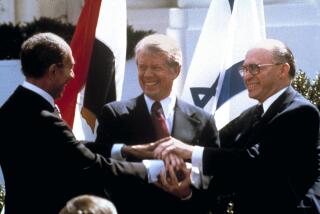Flower Blooms in Mideast Desert : Israel and Jordan sign peace treaty ending almost five decades of hostility
- Share via
Amid prayers, with homage to the dead of past wars and with eloquent expressions of hope for the future, Israel and Jordan have signed a peace treaty ending almost five decades of hostility.
It was a moving ceremony in the stark southern desert landscape the two countries share, a mood heightened by the personal memories of the leaders whose vision and determination made the accomplishment possible.
Prime Minister Yitzhak Rabin and King Hussein both remember the bitter beginning of the conflict they have now finally concluded. Rabin was a soldier in Israel’s 1948 war of independence, Hussein the grandson of the king who led Jordan into that war and who just three years later would be murdered by a political extremist, an act that would bring the young prince to the throne. Both have seen more than enough of war and suffering. Both now hope to see the peace they have agreed upon take firm hold.
Agreements pointing toward broad bilateral cooperation seek to anchor the new treaty in common national interests. But opponents of peace remain unmollified. Muslim fundamentalists in Jordan, like their counterparts in the Gaza Strip and Lebanon, scorn any peace with Israel. A majority of Jordan’s 4 million people--between 60% and 80%--are of Palestinian origin. Many have voiced reservations about the peace agreement. So it will take committed effort and time and above all a continued climate of political moderation to make this peace work.
Syria, which President Clinton visits today, can play a major role either to promote or to try to undercut regional political moderation. King Hussein showed great courage when he chose to proceed independently of his radical neighbor. Will President Hafez Assad now decide that the time has come to show the same vision in putting Syria firmly on the road to peace?
More to Read
Sign up for Essential California
The most important California stories and recommendations in your inbox every morning.
You may occasionally receive promotional content from the Los Angeles Times.













